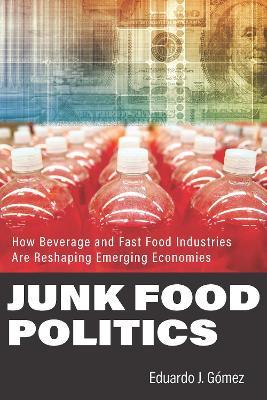Junk Food Politics: How Beverage and Fast Food Industries Are Reshaping Emerging Economies

Junk Food Politics: How Beverage and Fast Food Industries Are Reshaping Emerging Economies
Why do sugary beverage and fast food industries thrive in the emerging world?
An interesting public health paradox has emerged in some developing nations. Despite government commitment to eradicating noncommunicable diseases and innovative prevention programs aimed at reducing obesity and type 2 diabetes, sugary beverage and fast food industries are thriving. But political leaders in countries such as Mexico, Brazil, India, China, and Indonesia are reluctant to introduce policies regulating the marketing and sale of their products, particularly among vulnerable groups like children and the poor. Why?
In Junk Food Politics, Eduardo J. Gómez argues that the challenge lies with the strategic politics of junk food industries in these countries. Industry leaders have succeeded in creating supportive political coalitions by, ironically, partnering with governments to promote soda taxes, food labeling, and initiatives focused on public awareness and exercise while garnering presidential support (and social popularity) through contributions to government anti-hunger and anti-poverty campaigns. These industries have also manipulated scientific research by working with academic allies while creating their own support bases among the poor through employment programs and community services. Taken together, these tactics have hampered people's ability to mobilize in support of stricter regulation for the marketing and sale of unhealthy products made by companies such as Coca-Cola, PepsiCo, and Nestlé.
Drawing on detailed historical case studies, Junk Food Politics proposes an alternative political science framework that emphasizes how junk food corporations restructure politics and society before agenda-setting ever takes place. This pathbreaking book also reveals how these global corporations further their policy influence through the creation of transnational nongovernmental organizations that support industry views.
PRP: 327.60 Lei
Acesta este Prețul Recomandat de Producător. Prețul de vânzare al produsului este afișat mai jos.
294.84Lei
294.84Lei
327.60 LeiLivrare in 2-4 saptamani
Descrierea produsului
Why do sugary beverage and fast food industries thrive in the emerging world?
An interesting public health paradox has emerged in some developing nations. Despite government commitment to eradicating noncommunicable diseases and innovative prevention programs aimed at reducing obesity and type 2 diabetes, sugary beverage and fast food industries are thriving. But political leaders in countries such as Mexico, Brazil, India, China, and Indonesia are reluctant to introduce policies regulating the marketing and sale of their products, particularly among vulnerable groups like children and the poor. Why?
In Junk Food Politics, Eduardo J. Gómez argues that the challenge lies with the strategic politics of junk food industries in these countries. Industry leaders have succeeded in creating supportive political coalitions by, ironically, partnering with governments to promote soda taxes, food labeling, and initiatives focused on public awareness and exercise while garnering presidential support (and social popularity) through contributions to government anti-hunger and anti-poverty campaigns. These industries have also manipulated scientific research by working with academic allies while creating their own support bases among the poor through employment programs and community services. Taken together, these tactics have hampered people's ability to mobilize in support of stricter regulation for the marketing and sale of unhealthy products made by companies such as Coca-Cola, PepsiCo, and Nestlé.
Drawing on detailed historical case studies, Junk Food Politics proposes an alternative political science framework that emphasizes how junk food corporations restructure politics and society before agenda-setting ever takes place. This pathbreaking book also reveals how these global corporations further their policy influence through the creation of transnational nongovernmental organizations that support industry views.
Detaliile produsului













